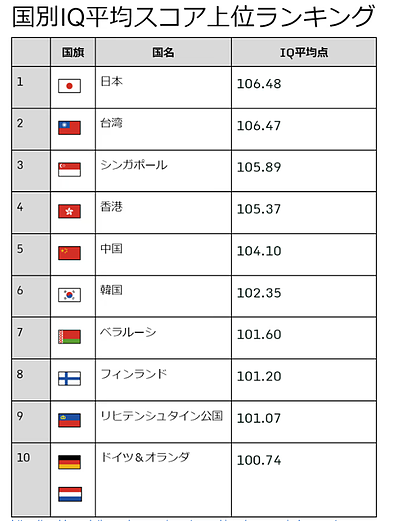
英検1級取得者によるオンライン個別指導のプロ
英語パーソナルジム HIET(ヒート)/ High Intensity English Training
- お電話での
お問い合わせ - 090-3825-5237
コラム
英文記事を読む:【PISA2022】日本の学力世界トップレベル 1位はシンガポール
2023年12月5日 公開 / 2023年12月6日更新
本記事は独学・国内学習による
英検1級保持者が書きました。
経済協力開発機構(OECD)は2023年12月5日、
国際的な学習到達度調査「PISA2022」を発表しました。
「PISA(Programme for International Student Assessment)」は、
OECDが中心に実施している国際的学習到達度に関する調査。
義務教育修了段階の15歳の生徒(日本では高校1年生)を対象に、
これまでに身に付けてきた知識や技能を、
実生活のさまざまな場面で直面する課題に
どの程度活用できるかを測る目的。
「数学的リテラシー」
「読解力」
「科学的リテラシー」
の3分野について、2000年から3年ごとに調査を実施しています。
前回テストで日本の読解力リテラシーが最低であったことで、
大きな話題と懸念事項になっていました。
自称教育専門家たちの
「英語なんかやってる場合か論」
「国語力が全ての土台だ論」
が跋扈しました。
無論、英語教育の観点では「読解リテラシー」に注目します。
今回日本人の読解力は決して落ちてはいないことが証明された
と言えるでしょう。
【数学的リテラシー】:全参加国・地域中で5位、
【読解力】:同3位
【科学的リテラシー】:同2位
日本の順位の推移をみると、
【読解力リテラシー】
全参加国・地域中で
・2000年8位
・2003年14位
・2006年15位
・2009年8位
・2012年4位
・2015年8位
・2018年15位
・2022年3位
【数学的リテラシー】
2003年6位
2006年10位
2009年9位
2012年7位
2015年5位
2018年6位
2022年5位
【科学的リテラシー】比較できる2006年以降をみると、
2006年6位
2009年5位
2012年4位
2015年2位
2018年5位
2022年2位
ちなみに、2023年度実施のIQテストスコアでも、
日本は世界1位でした。
このような誇らしい結果を子供世代に伝えるのは、
成人した日本人全員の喜ばしい義務でしょう。
Singapore students rank top inmaths, science and reading in OECD study
The Straits Times
2023/12/05
SINGAPORE - Fifteen-year-olds here have emerged top performers in an international benchmarking study to measure how well students use their knowledge and skills to solve real-world problems.
Based on the performance of 6,606 students from 149 secondary schools and 15 private schools, including international schools and madrasahs, Singapore was ranked No. 1 for mathematics, science and reading in the Programme for International Student Assessment (Pisa) 2022.
The study, which is done every three years by the Organisation for Economic Cooperation and Development (OECD), was delayed by a year because of the Covid-19 pandemic.
In the last Pisa study in 2018, Singapore was ranked second after China, which did not participate in the latest study because its schools were closed when the study was being conducted.
Compared with 2018, Singapore students who took part in Pisa 2022 maintained their performance in mathematics and improved substantially in science, but their performance declined slightly in reading.
The Education Ministry said the decline in reading for Singapore students is similar to their peers in many other countries and may reflect the impact of a global change in reading habits.
The latest Pisa cycle also showed that Singapore continued to have high proportions of students who did well.
In reading, for instance, 23 per cent of students in Singapore were top performers. For mathematics and science, the figures were 41 per cent and 24 per cent respectively. Top performers achieve proficiency in level five and six.
Similarly, Singapore had fewer students who were low performers in reading at 11 per cent and in mathematics and science at 8 per cent. This refers to students who achieve below proficiency level two.
The Education Ministry said in a press release that the Pisa 2022 results, taken together with the results of another international benchmarking study, the Progress in International Reading Literacy Study (Pirls), affirm the resilience of our education system.
In the Pirls study released in May, Primary 4 pupils in Singapore emerged as the top readers in the world.
MOE paid tribute to teachers here and said the results reflect the dedicated efforts of schools and teachers in supporting the learning and well-being of students throughout the pandemic.
Noting that Pisa tests students’ ability to apply what they have learnt to unfamiliar settings and real-world contexts, MOE said: “Singapore students have shown that they are good in mathematical reasoning, can distinguish between relevant and irrelevant information, and use computational thinking (for example, pattern recognition, defining algorithms) as they solve complex problems in a variety of modern contexts.”
These are critical skills that will prepare students well for global changes like digitalisation, the emergence of new technologies and the advent of new professions.
MOE also said “Singapore students continue strong performance despite Covid-19 disruptions, including those from lower socio-economic status homes”, based on figures that showed students from disadvantaged homes did better than the OECD average in all three domains tested.
The Pisa 2022 survey highlighted a few problem spots for Singapore students.
One was their perception of a lack of support from their parents, and another was the lack of physical activity among them, with 29 per cent reporting they do not exercise at all after school.
Commenting on the results, Education Minister Chan Chun Sing said on his Instagram page: “Great job to our students for persevering with their learning despite disruptions caused by the pandemic.
“My deepest gratitude to our educators too, who adapted quickly when learning pivoted online, and came up with many innovative teaching methods to ensure that learning continued.”
Mr Chan added: “We will not rest on our laurels and continue to work closely with schools, parents and partners to support our students in their education journey.
“Let us always strive to surpass ourselves, rather than focusing on outperforming others.”
Dr Andreas Schleicher, director for education and skills and special adviser on education policy to OECD’s secretary-general, praised Singapore for continuing to lead the global league tables in Pisa.
“It has been one of the few countries that saw no negative effects on learning outcomes during the pandemic,” he said, adding that there are many factors at play, including the consistent and high expectations on students and an instructional system that provides rigour in terms of cognitive demand and focus.
He said another factor is the push to teach fewer things in greater depth, and coherence – in terms of modelling learning progressions carefully, for example, in Singapore mathematics.
Noting some areas of concern, he said: “Social disparities in learning outcomes remain clearly visible in Singapore. Also, in terms of students’ sense of belonging, Singapore is more an average rather than a high performer.
“Not least, we have seen a decline in parental support and engagement in Singapore, an area in which Singapore used to be strong.”
● singapore: シンガポール
● fifteen-year-olds: 15歳の生徒たち
● international benchmarking study: 国際基準調査
● measure: 測定する
● knowledge: 知識
● skills: スキル
● solve real-world problems: 実世界の問題を解決する
● performance: 成績
● secondary schools: 中学校
● private schools: 私立学校
● including: を含む
● international schools: 国際学校
● madrasahs: マドラサ
● ranked: ランク付けされた
● mathematics: 数学
● science: 科学
● reading: 読解
● programme for international student assessment: 国際学生評価プログラム
● study: 調査
● organisation for economic cooperation and development: 経済協力開発機構
● delayed: 遅延した
● covid-19 pandemic: 新型コロナウイルスのパンデミック
● participate: 参加する
● schools were closed: 学校が閉鎖されていた
● conducted: 実施された
● compared with: と比較すると
● maintained: 維持された
● substantially: 大幅に
● declined slightly: 若干成績が低下した
● education ministry: 教育省
● peers: 仲間
● reflect: 反映する
● impact: 影響
● global change: 世界的な変化
● habits: 習慣
● latest pisa cycle: 最新のpisaサイクル
● continued: 続いた
● high proportions: 高い割合
● top performers: 優秀な成績者
● achieve proficiency: 能力を発揮する
● level five and six: レベル5および6
● low performers: 低成績者
● proficiency level two: 能力レベル2
● press release: プレスリリース
● results: 結果
● international benchmarking study: 国際基準調査
● progress in international reading literacy study: 国際読解力調査
● affirm: 確認する
● resilience: 強靱さ
● tribute to: 敬意を表す
● results reflect: 結果を反映する
● dedicated efforts: 献身的な努力
● schools and teachers: 学校と教師
● supporting: 支援する
● well-being: 幸福
● pandemic: パンデミック
● noting that: 〜を指摘して
● tests students’ ability: 生徒の能力をテストする
● apply: 適用する
● unfamiliar settings: 未知の状況
● real-world contexts: 実際の現場
● good in: 〜が得意である
● mathematical reasoning: 数学的な推論力
● distinguish between: 区別する
● relevant and irrelevant information: 関連性のある情報と無関係な情報
● use computational thinking: 計算思考を使用する
● pattern recognition: パターン認識
● defining algorithms: アルゴリズムの定義
● solve complex problems: 複雑な問題を解決する
● variety of modern contexts: 様々な現代の文脈
● critical skills: 重要なスキル
● prepare students well: 生徒をよく準備する
● global changes: 世界的な変化
● digitalisation: デジタル化
● emergence of new technologies: 新しい技術の出現
● advent of new professions: 新しい職業の到来
● social disparities: 社会的な格差
● visible: 明確に見られる
● sense of belonging: 所属意識
● average performer: 平均的なパフォーマー
● parental support: 親の支援
● engagement: 関与
● used to be strong: 以前は強力だった
● Instagram page: インスタグラムページ
● disruptions caused by the pandemic: パンデミックによる混乱
● deepest gratitude: 最大限の感謝
● adapted quickly: 迅速に適応した
● pivoted online: オンラインに切り替わった
● innovative teaching methods: 革新的な教授法
● ensured that learning continued: 学習が継続されることを確保した
● rest on our laurels: 名声に甘んじる
● work closely with: 密接に連携する
● surpass ourselves: 自分自身を超える
● focus on outperforming others: 他人を凌駕することに焦点を当てる
● director for education and skills: 教育とスキルのディレクター
● special adviser on education policy: 教育政策の特別顧問
● league tables: リーグ表
● negative effects: 負の影響
● learning outcomes: 学習成果
● instructional system: 教育システム
● rigour: 厳格さ
● cognitive demand: 認知的な要求
● push to teach fewer things in greater depth: より深く少ないことを教える推進
● coherence: 一貫性
● modelling learning progressions: 学習の進行をモデル化する
● carefully: 注意深く
● areas of concern: 懸念のある領域
● social disparities in learning outcomes: 学習成果における社会的な格差
● students’ sense of belonging: 生徒の所属意識
● parental support and engagement: 親の支援と関与
● used to be strong: 以前は強力だった
シンガポールでは、15歳の生徒たちが実世界の問題を解決するためにどれだけ知識やスキルを使っているかを測る国際的な基準の調査で、最も優れた成績を収めました。
149の中学校と15の私立学校、国際学校やマドラサを含む6,606人の生徒の成績に基づき、シンガポールは国際学生評価プログラム(Pisa)2022年において数学、科学、読解の分野で第1位にランクされました。
この調査は、経済協力開発機構(OECD)が3年ごとに行っており、新型コロナウイルスのパンデミックの影響で1年遅れて実施されました。
2018年のPisa調査では、中国が第1位でシンガポールは2位でしたが、最新の調査には中国が参加せず、調査が行われた時に同国の学校が閉鎖されていたためです。
2018年と比較すると、Pisa 2022に参加したシンガポールの生徒は数学では成績を維持し、科学では大幅に向上しましたが、読解では若干成績が低下しました。
教育省は、シンガポールの生徒の読解力の低下は、多くの他の国の仲間と同様であり、読書習慣の世界的な変化の影響を反映している可能性があると述べました。
最新のPisaサイクルでは、シンガポールは引き続き優秀な生徒の割合が高いことが示されました。例えば、読解ではシンガポールの生徒の23%が優秀な成績を収めました。数学と科学ではそれぞれ41%と24%で、優秀な生徒はレベル5と6で能力を発揮します。
同様に、シンガポールでは読解の低成績者が11%、数学と科学では8%にとどまりました。これは、能力レベル2未満の生徒を指します。
教育省はPisa 2022の結果について、国際的な基準として別の調査である国際読解力調査(Pirls)の結果と合わせて、我々の教育システムの強靱さを確認しています。
今年5月に発表されたPirls調査では、シンガポールの小学4年生が世界で最も読解力が高いことが明らかになりました。
教育省はここでの教師に敬意を表し、学校や教師がパンデミック中も学習と生徒の幸福を支援するために迅速に適応し、多くの革新的な教授法を考案した結果であると述べました。
Pisaは生徒が学んだことを未知の状況や実際の現場に適用する能力をテストするとされ、教育省は「シンガポールの生徒は数学的な推論力に優れ、関連性のある情報と無関係な情報を区別し、複雑な問題を現代の様々な文脈で解決する際に計算思考(例えば、パターン認識、アルゴリズムの定義)を使用できることを示しています」と述べています。
これらは、デジタル化や新しい技術の出現、新しい職業の到来などの世界的な変化に対応するために生徒をよく準備する重要なスキルです。
教育省はまた、「Covid-19の混乱からの学習成果にもかかわらず、低所得層の家庭出身の生徒を含むシンガポールの生徒が強力な成績を続けている」と述べました。これは、不利な状況にある家庭から来た生徒が3つの領域すべてでOECD平均よりも優れた成績を収めていることを示しています。
Pisa 2022の調査では、シンガポールの生徒のいくつかの問題点が浮き彫りにされました。その1つは、親からの支援の不足に対する生徒の認識であり、もう1つは彼らの間での身体活動の不足で、29%が放課後に全く運動していないと報告しています。
教育大臣のチャン・チュン・シンはインスタグラムで、結果についてコメントし、「パンデミックによる混乱にもかかわらず、学習を続けるために努力を重ねた生徒たちに最大限の賞賛を送ります。そして、学習がオンラインに切り替わったときに迅速に適応し、学習を継続するために多くの革新的な教授法を考案した教育者に深い感謝を捧げます。」
また、「私たちは自分自身を超えるよう努力し続け、他人を凌駕することに焦点を当てるのではなく、学校、親、そしてパートナーと緊密に連携して生徒たちを教育の旅路で支援し続けます。」と付け加えました。
OECD事務局長の教育政策に関する特別顧問であるアンドレアス・シュライヒャー博士は、シンガポールがPisaの世界的なリーグ表で引き続きリードしていることを称賛しました。
「パンデミックによる学習成果への負の影響を見られなかった数少ない国の一つです」と述べ、「学習者への一貫した高い期待や認知要求の厳しさを提供する教育システムなど、多くの要因が関与しています。」
彼はさらに、「学習成果における社会的な格差はシンガポールでも明確に見られます。また、生徒の所属意識に関しては、シンガポールは平均的なパフォーマンスであり、高いパフォーマーではない」と指摘しました。
「さらに、シンガポールでは親の支援と関与が減少しており、以前は強力だった分野です」と述べました。
今後も英語学習に関わる情報、体験談を発信していきます。

関連するコラム
- 英文記事を読む テロは撲滅できるか 2023-11-15
- 英文記事を読む「海洋プラスティックゴミ問題」 日本人がプラスティックを食べるバクテリア発見! 英国ガーディアン紙 2023-11-17
- 英文記事を読む:ロックンロールがベルリンの壁をぶち壊した! ★映像の世紀 ★ビートルズ革命 2023-12-30
- 英文記事を読む:外国語を司る脳部位特定《東大/マサチューセッツ工科大》 2024-01-21
- 英文記事を読む:英語スピーキングテスト問題公表 今回も事故! 意見表明 正答率 4.2% 2023-11-30
コラムのテーマ一覧
カテゴリから記事を探す
TEX 二井原プロへの
お問い合わせ
マイベストプロを見た
と言うとスムーズです
勧誘を目的とした営業行為の上記電話番号によるお問合せはお断りしております。









